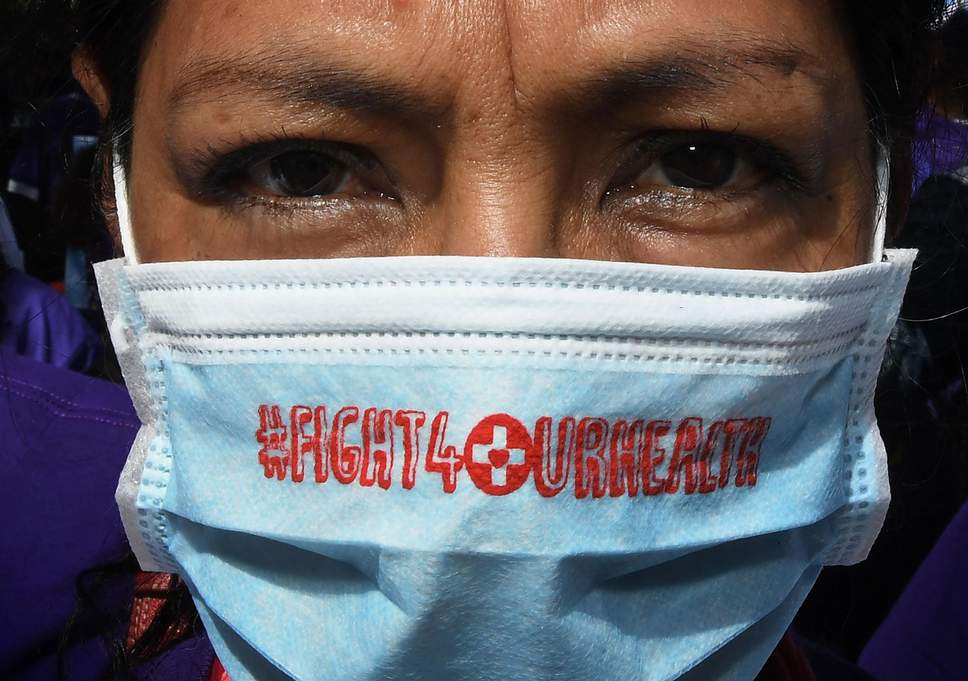
If you think Congress’s recent failure to repeal the Affordable Care Act spares the law, think again. Twenty states, backed by Donald Trump’s Department of Justice, are trying in the courts to effectively dismantle the law by attacking what they see as its Achilles heel: the individual mandate.
That provision of the ACA, popularly known as Obamacare, is simply the requirement that people who can buy insurance do so, or pay a penalty. It was effectively annulled by last year’s tax law, which zeroed out the penalty and rendered the mandate toothless.
The 20 state plaintiffs now want the mandate itself declared unconstitutional, hoping that will invalidate the rest of the law – most importantly the part that forbids insurers from denying coverage to people with pre-existing conditions.
The ACA requires insurers to cover anyone who's able to pay for a policy – what's known as “guaranteed issue” – so it’s only fair to insurers that everyone be required to buy coverage. Otherwise, through the “law of adverse selection,” a preponderance of sick people will buy insurance while healthier people won’t. (That's because healthy folks, mostly young people, think they’ll never get sick and therefore have no reason to buy coverage, especially when they know that in an emergency they will get care anyway.)
This poses two problems. First, by refusing to buy coverage, these people essentially foist their medical bills onto the people who do buy insurance. Out of medical ethics alone, no hospital worth its salt is going to turn away people in urgent need of care. In fact, federal law doesn’t allow it, as the Medical Treatment and Active Labor Act (also known as the “patient anti-dumping act”) requires virtually all hospitals to provide emergency care whether or not the patient is insured.
The second problem is known as the “death spiral.” Insurers have to raise premiums to cover costs incurred by the willfully uninsured, which in turn excludes more people from the market, meaning more uncovered costs for the insured to pay, and so forth. It’s not hard to see why this is unsustainable.
A mandate of some sort is one of two elements that are essential to achieve a universal risk pool. (The other is a prohibition on insurer “risk selection,” or cherry-picking the sickest, most expensive people out of risk pool because of a pre-existing condition.) Without the mandate, there will always be some irreducible number of uninsured people whose healthcare bills everyone else pays for.
The individual-mandate penalty tries to induce participation, but it’s so modest that it often makes more sense to pay it than to buy insurance. Nonetheless, the GOP's attack dogs went after the mandate on Day 1, filing suit against the ACA seven minutes after Obama signed it into law.
Conservative lawmakers despise the mandate (or are ordered to despise it by their corporate donors) for reasons that they have never adequately explained, but let’s take a moment to appreciate the shameless hypocrisy and sheer incoherence at play here.
The mandate’s opponents initially claimed that it was unconstitutional because it forced people to buy a private product. This is right-wing duplicity on speed: These were the same opponents who kept a “public option” – a government insurer that would have competed against private insurers – out of the ACA. Had the public option been included, there would have been scant basis for arguing that the ACA forces people to buy a privately provided product. In any event, the Supreme Court saved the mandate in a surprising 2012 ruling that asserted the penalty is really a tax and therefore constitutional.
The current suit argues that the mandate is unconstitutional because there is no associated tax – of course not, since Republicans have eliminated it – and that the doctrine of “severability” requires repealing the rest of the law. That doctrine holds that if a law cannot operate without a provision that has been declared unconstitutional, then the whole thing has to go.
The Department of Justice has endorsed this argument, a typically specious example of Trump-junta duplicity, and thereby produced two sterling examples of the fraudulence that passes for conservative principle.
First, the old canard about liberal courts “legislating from the bench.” Judicial precedent has long established that the application of severability turns on congressional intent, and Congress clearly thinks the ACA can operate without a mandate because it has so far left the rest of the law in place. To have a court overturn legislative intent would require the sort of judicial “overreach” of which conservatives are always accusing liberals. Who’s the judicial activist now?
Two, conservatism is supposed to be all about personal responsibility. So why does the right oppose what is essentially a conservative idea, namely that if you can pay your own way you ought to? It’s supposedly those namby-pamby, bleeding-heart liberals who want free lunches for everyone. Without a mandate or something like it, people who don’t buy coverage can free-ride on the people who do, and apparently that’s OK. Who’s the bleeding heart now?
The idea for a mandate was popularized largely by the conservative Heritage Foundation three decades ago and was initially endorsed by people like Newt Gingrich. It’s a pillar of Massachusetts’ landmark 2006 health-insurance law, which in its essentials is identical to Obamacare. The Massachusetts law was signed by then-Gov. Mitt Romney, who later ran for president as an opponent of Obamacare.
Oh, and another little detail: The mandate has worked, helping bring down the rate of uninsured people, Obamacare’s ultimate goal. Remove the mandate, and why would you expect anything but a drop in participation and a rise in insurer reluctance to cover a sicker, more expensive risk pool without raising premiums?
Opposition to Obamacare comprises a dense thicket of ignorance, misrepresentation and fraudulence that obscures any coherent principle, apart from partisan tribalism. “Conservatives” are lucky that they don’t have to buy credibility insurance on an unregulated market, because dishonesty is a pre-existing condition.














